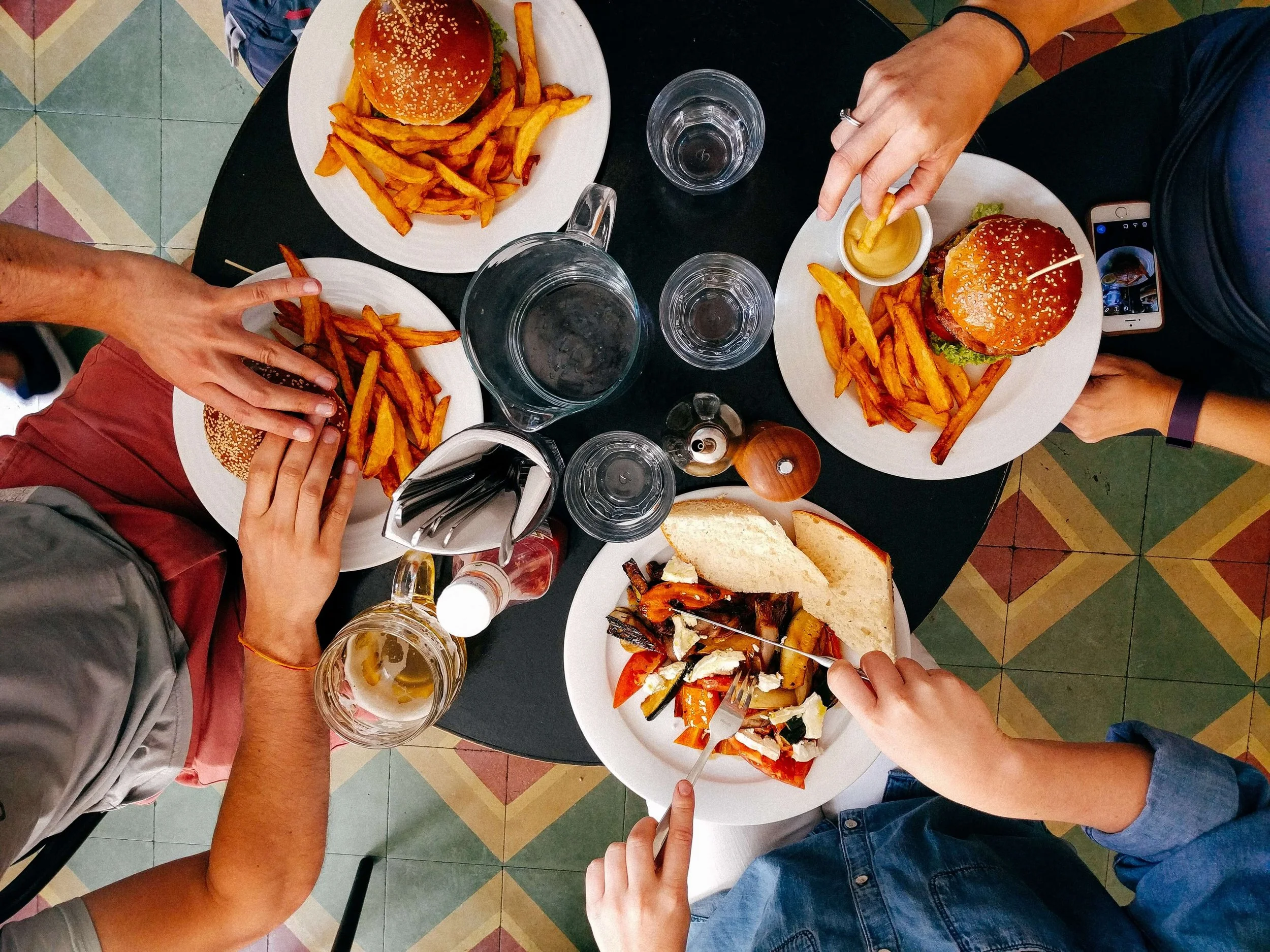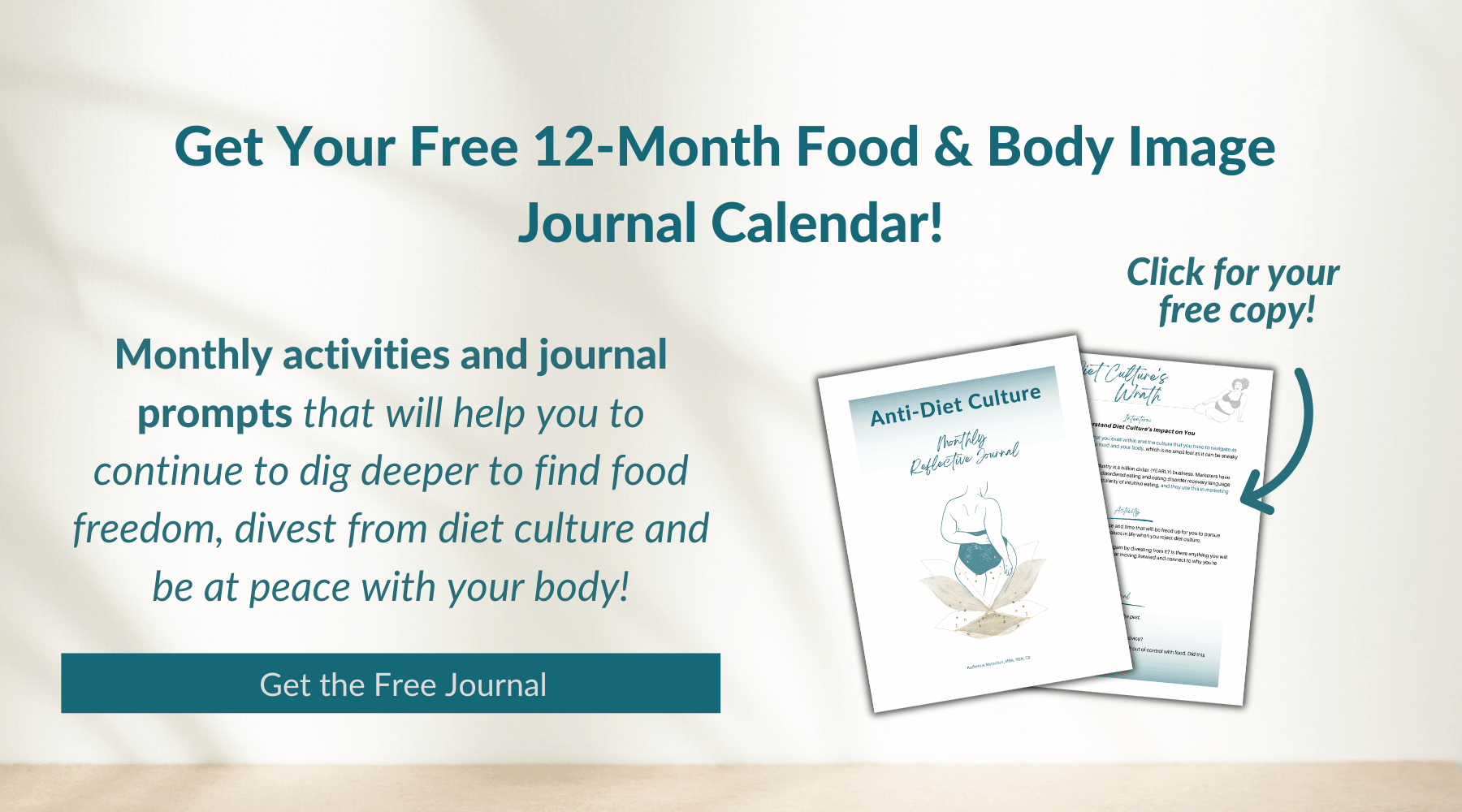Why You’re Hungry After Dinner and What to Do About It
Prefer this in video? Click below!
Picture of Youtube video with Katherine Metzelaar on why you feel hungry after meals and what you can do about it
Picture this: it’s evening time. You’ve finished a long day, you’ve eaten your dinner, and you’re starting to unwind. The dishes are mostly done and you’re considering the next thing to do.
But, you’re distracted because you’re starting to notice hunger again. Maybe you grab a snack and move on. Maybe you open the fridge or pantry door and stare at the options. Maybe you feel angry that you “shouldn’t” be hungry again and ignore the signs. Maybe you ignore the hunger for a while only to find yourself back in the kitchen and snacking throughout the rest of the evening.
Do any of those experiences resonate with you?
For some people, feeling hungry after a meal is no big deal. But for the vast majority of people, feeling hungry after a meal, especially dinner, is frustrating, confusing, and brings up judgment. The voice in your head may be saying things like…
“I just ate dinner!”
“How could I be hungry already?
“Now’s not the time to eat, it’s too late!”
“Something must be wrong with me. Why is my body doing this to me?”
“Will I ever stop eating?”
“I can’t eat again, I have already had so much to eat!”
The good news is that hunger after dinner is a common experience, whether you’ve been in recovery from disordered eating or you’re just starting to notice diet culture and the things that feel off in your relationship with food. How you respond to your hunger cues dinner will give you a lot of insight and be helpful if you’re feeling stuck when it comes to food and your body. Read on to learn why you might be hungry after dinner and what to do about it in healing your relationship with food.
Hunger gets confusing in diet culture.
As part of its ethos, diet culture encourages you to disconnect from your body and therefore the signals it communicates to you. Hunger is seen as dangerous in diet culture when it’s outside of the parimeters when diet culture says it’s OK to eat. Having an appetite is wrong, but if you do have one, it needs to be at certain meal times and at certain times of day, and only in certain amounts. The message often is: If you can keep hunger at bay outside of meal times, you will supposedly eat less and loose weight. Chances are good that you’ve learned to override your hunger cues throughout years of dieting and disordered eating. You don’t trust your hunger because you’ve been told your whole life that your hunger, and by extension your body, is untrustworthy.
The process of healing your relationship with food and rejecting diet culture requires looking at hunger differently from a place of curiosity and see it as something that’s informative. It is remarkable that your body can communicate its need for nourishment to you. And, when challenging the diet mindset, it’s more helpful to look at hunger as not good, not bad, but as neutral. Hunger is information your body is providing you. However, it is totally okay if you’re at a place where you judge yourself for feeling hungry. Noticing judgment come up is a huge first step as you’re reconnecting with your hunger.
Another aspect that can be helpful as you’re getting to know hunger and reframing it as more neutral is considering the context of when you’re experiencing hunger. In particular, if you’re finding yourself hungry after dinner, factors like what you’re eating, if you’re eating enough, the nuances of hunger cues, and distraction could all be playing roles.
Why you may be hungry after dinner:
You are eating too many voluminous foods.
Voluminous foods are foods that take up a lot of space on the plate, like fruits and vegetables. Often in diet culture you are told to “fill up on fruits and veggies.” And while voluminous foods like fruits and veggies can be great to enjoy if you like the taste of them, a plate of them isn’t energy dense and all leave you feeling hungry 1-2 hours after eating. Since they lack energy density (ie they don’t have enough calories to meet your needs), the feeling of being full from them won’t last too long. In addition to this, too many fruits, vegetable and whole grains can leave you feeling bloated and uncomfortable after meals. Therefore, when you find yourself after post dinner this can add to the discomfort because you’re already full. Pay attention to how much of your meal is made up of voluminous foods as this may be affecting your hunger post-mealtime.
You’re not eating enough at meals.
You may feel like you’re eating enough, but it’s possible (and likely) that your meals aren’t actually providing enough to meet your energy needs. If you’re hungry within an hour or so after eating, you may be genuinely hungry because you haven’t eaten enough food. You may be thinking, “Of course I’m eating enough!” I hear you, and diet culture often skews your perception of how much is “enough” food. The types of foods (as mentioned above) and portions you’re eating may contribute to you feeling hungry. It may be worth challenging yourself to have more food at meals than you think is “enough,” and seeing how that affects your hunger level afterwards. In particular, it can be helpful to make sure you’re getting enough proteins, fats and carbs at meal time.
You’re out of sync with your body.
You may be confusing hunger with other physical sensations inside your stomach or throughout your body. For example, sometimes people feel anxiety in their stomach or abdomen. This can feel like emptiness or tension, making it feel similar to hunger. Also, interestingly sometimes the process of digestion with food moving through your stomach can feel like hunger pangs. These are just two of several examples how hunger can be confusing if you aren’t very connected to your hunger cues and your body. Being disconnected from the nuances of hunger cues can be especially common if you’ve had a history of an eating disorder, disordered eating or dieted for a long time. So, feeling hunger shortly after dinner in a situation where you feel sure you’ve eaten enough may be an invitation to learn more about the subtleties in body sensations you experience so you can better identify when you’re truly hungry. To be clear, you don’t need to know and learn the nuances of your hunger cues in order to heal your relationship with food, and not everyone will be able to connect with their hunger cues over time such as with eating disorders, a history of trauma, and neurodivergence.
You’re distracted at meal times.
Being distracted can affect your level of satisfaction after the meal. This can be distraction for positive reasons such as when talking with company or being captivated by a new TV series. Distraction at meals can also occur with tough emotions or experinces like anxiety or discomfort. If you’re feeling anxious, stressed or overwhelmed at meal times, as it may be when you’re distracted, you might find yourself with a lower appetite than normal. In that case you will eat less and feel full short term, or you may lose interest in food temporarily, but then notice hunger later. Or, you might be distracted and eat enough but not necessarily feel satisfied because you couldn’t be as present and connected to the eating experience. Either way, it can be validating to recognize the social and emotional context of your eating environment and begin to notice how this impact and effects your hunger after dinner.
You Haven’t given yourself any fun foods or pleasurable foods
How many times have you eaten enough food (calories, protein, etc.) and still found yourself hungry or wanting more food after dinner, but you’re not quite sure what it is? My guess is that this has happen to you A LOT. An important part of feeling satisfied after dinner is assuring that you’re getting foods that are fun and pleasurable to you. You can eat all the chicken, broccoli and rice in the world, but if you’re not eating sweets when you want, you’re going to be left feeling like there is something missing from the meal.
You’re trying to eat “replacement” foods
It’s common when dieting to try to replace your favorite foods with other foods. This will often fill-up your stomach, but it leaves you feeling unsatisfied. For example, no amount of frozen whipped cream will ever be ice cream. No amount of veggie pasta will ever be regular pasta. etc. At the meals where you feel hungry after dinner, check in with yourself to see if you’ve tried to replace the foods you actually want with foods that feel safer for you. If you are eating a lot of replacement foods, you may want to consider introducing the foods you truly want as a way to feel more satisfaction at dinner time.
In ADDITION to this, here are some questions that you can ask yourself if you’re finding yourself doubting or feeling afriad of your hunger after dinner:
What do I imagine would happen if I allowed myself to eat right now?
In what ways am I denying my hunger on a regular basis?
Can I try experimenting with honoring my hunger even if I disagree with it?
Can I look at the physical sensations in my body through a curious lens and without judgment?
What if my body was trying to communicate a need with me when I’m hungry and wasn’t out to try to trick me?
If I’m hungry after dinner often, could this mean that I’m not getting enough food to meet my needs?
Consider practicing some self-reflection or journaling around these prompts, and getting extra support from an anti-diet dietitian if you’re feeling stuck. As you work to heal your relationship with food, you might find that you’re hungry shortly after some meals. That doesn’t mean you’re doing anything wrong. Eating again shortly after a meal or eating a meal that’s larger or denser than you’re used to may feel foreign right now, and that’s okay. Continuing to experiment with honoring your hunger is crucial.
Remember, connecting to hunger does not happen overnight. It may be confusing and involve rethinking your prior notions about your hunger. Slowly working on normalizing hunger, getting to know your hunger cues, and gaining a better sense of what makes you most satisfied will help you to feel more connected and less lost when it comes to your hunger after dinner and in general. As you begin to trust your hunger, hunger cues will be less confusing, scary, frustrating and overwhelming.
You’ll also love…
Are you confused about why you’re experiencing hunger after dinner or after meals?
Connecting to your hunger and nourishing your body with satisfying meals is often easier said than done. It doesn’t have to feel complicated and confusing though! At Bravespace Nutrition, our Seattle-based anti-diet Dietitians and eating disorder specialists work virtually helping people who are struggling with food and body image. It’s possible to change your relationship with food and your body, free up headspace, and live your life with more presence, abundance and peace. You don’t have to keep feeling confused about hunger after meals. Learn more about Bravespace Nutrition, our philosophy, and the services we offer.




